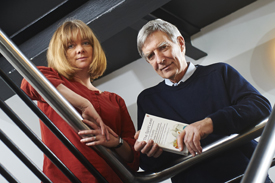Why the growing gap between rich and poor is bad for us all
It may be five years since two University of York academics published The Spirit Level, but the book’s central message that income inequality is bad for our health, wellbeing and welfare is as true today as it was then.
Indeed in 2014, in the aftermath of global economic meltdown, the growth of protest groups such as the Occupy movement and the widening gap between rich and poor, the book by Professor Kate Pickett, Professor of Epidemiology at York and Professor Richard Wilkinson, Honorary Visiting Professor at York’s Department of Health Sciences, has even more resonance.
It sold over 250,000 copies around the world, was translated into 23 different languages but, if anything, the authors say evidence to support arguments for greater equality is now even more persuasive. New studies confirm that inequality has psychosocial effects causing insecurities about social status, with knock-on effects for stress levels, cognitive performance and emotional stability.

Professor Kate Pickett and Professor Richard Wilkinson
Professor Pickett also highlights new economic research which shows that greater inequality leads to shorter spells of economic expansion and more frequent and severe boom-bust cycles.
We are also increasingly unhealthy with the growing difference in life expectancy between rich and poor areas highlighted by Professor Pickett as the biggest human rights abuse in developed countries.
She adds: “Recent figures show that the gap in life expectancy between those in London’s affluent and deprived wards is now nearly 25 years. Growing health inequality is often portrayed as a result of people’s lifestyle choices, but one of the greatest determinants of a person’s health is their income.
“If you rank neighbourhoods from the richest to the poorest, you almost perfectly match health from best to worst. The solution is not to try to change people’s health related behaviour but to address the income inequality, unemployment and low pay economy that grinds people down and takes its toll on their physical and mental health.”
One encouraging sign is growing support across the UK for fairness commissions set up by local councillors, academics, professionals and church groups from Newcastle to Newport. The aim of the commissions is to reduce inequalities and tackle pay disparities. As a result, many councils and private sector employers have gone on to pay a living wage to lift more people out of poverty and reduce employee turnover.
“High salaries and bonuses are often undeserved and it is becoming increasingly clear that the inequality they create damages society,” says Professor Wilkinson. “At the same time, austerity measures hit hardest those who least deserve them and regulation is resisted by those with a vested interest in protecting their wealth.
“Valuing growth above equality causes problems for societies around the world. Even allowing for the current economic circumstances, we live in an era of unprecedented prosperity, comfort and extravagance, yet we find ourselves more isolated, unhealthy and unhappy than ever.
“Our research shows this will not change until we address the growing gap between the richest and poorest.”
